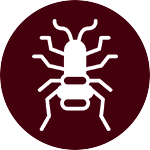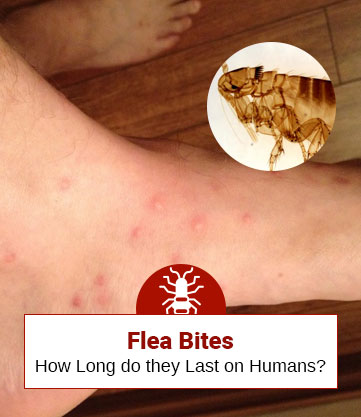 get free exterminator quotes
get free exterminator quotes


Flea Bites: How long do they last on humans?
Flea bites are painful. Though being insignificant in size and wingless, they are irritating when they bite you. Their bites leave a scratch mark on your skin and an itchy sensation that lasts even for a longer time.
They bite as they survive on the blood-soaked from you, through your skin. Elimination of fleas from your house and neighborhood is essential but controlling flea bites is a necessity too. But first, you should know how long a flea bite lasts?

Fleas first target the non-human pests in your house, as it is easier for them to jump on the pets and hide in their furry skins. But fleas sometimes go for human blood too. Even if you don’t have a pet in your house, fleas come to you from your garden or yard or from a nearby pet who is affected.
Flea bites last from 24 to 48 hours normally. But people who have sensitive skin, particularly in the case of children, the bite lasts longer. Some people who are allergic to the flea saliva, which is the main reason behind having a prickly sensation (reaction with histamine), tend to have swollen marks which may last for weeks.
You can have adverse reactions after a flea bite, like extreme pain at the point of bite, too much swelling, breathlessness, feeling nauseous, etc. In these cases, you must consult a doctor immediately. If you have tiny red swollen bites on your body, after roaming outside your house, you are bitten by fleas. Consult a pest expert for your outdoors now!

You will be surprised to know that a flea is deaf and blind. In spite of that, once they jump they are 50% faster than a space rocket and they can carry on doing so 30,000 times.
When a flea bites, it secretes saliva into the human skin. This process prevents blood clotting and makes the spot of the bite numb so that humans become unaware of their presence. After the bite, the human body naturally releases histamines, as a resistance method. That is how the human body is made.
Histamines are chemicals naturally prepared by the human immune system. They help in getting rid of anything which might infect the human body. The common reactions of histamines are sneeze, tear up and itch. When the saliva of the flea mixes with the histamine, automatically humans tend to scratch and rub at the place of bite.
Flea bites look smaller than mosquito bites but in groups. They are small red lumps in clusters of 2 to 4 or in a line. They don’t enlarge like mosquito bites after some time. If you are allergic to flea bites, the bite marks develop into large swellings and continuous scratching them causes blisters.
The commonest places of flea bites in a human body are around ankles and legs. The other common areas include waist, armpits, breasts, groin or at the folds of elbows and knees.
The treatment of flea bites revolves around the swellings and the irritating itchy sensation caused by the bite. Once you realize that you have been bitten by a flea, make sure you don’t scrub the tiny itchy red lumps and make them worse. Try applying an ice pack to the area.
The ice pack reduces the itching sensation subsequently and the small bumps caused by the bites do not swell. Most of the households have a handy hydrocortisone cream for immediate problems like itching, rash, insect bites, etc. Apply it to the affected area and the itching sensation will reduce more.
Natural skin moisturizers like aloe vera gel can be a helpful solution in these conditions. Firstly it is a natural product, extracted from the plant and secondly it is a common home skin moisturizer that softens the skin and reduces the itching. You can use antihistamine oral medicines like Cetirizine, Allegra, and Claritin too. Calamine lotion is also another remedy to ease the itchiness.
This video shows you, how flea bites look like:
Get rid of the fleas as soon as you see them. They come to your home through your pets, through the pets in your neighbor and from your lawn or backyard. Check your pets regularly whether they are infected by fleas or not. Check your neighborhood and your lawns and backyard. If you have a severe flea infestation at your home, immediately contact a professional exterminator.
You might take some measures before that though:
Most people tend to mix bed bug bites with flea bites because both the bites form small dots on the skin. Flea bites tend to develop itchiness after the bite and it stays even after a day or two. Fleas bite at the lower half and in the warm and moist areas of your body like bends of elbows and knees.
Bed bugs bite at the upper half like around the face, neck, and arms. Bed bugs only bite at night time. Also, the pattern of the bite can help you determine whether it is a bed bug bite or a flea bite. A healthy human being should not worry too much about flea bites, other than the prickly sensation on the bitten area.
Avoid rubbing the affected area, apply medicated ointments and consult a doctor if the issue takes a serious turn. For people having allergies, it is a serious issue.